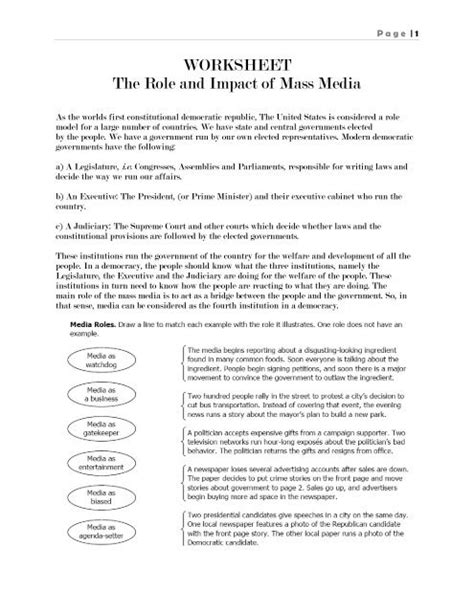In the digital age, the media has become an omnipresent force, shaping our perspectives, influencing our behaviors, and connecting us to the world around us. Understanding the role of media is crucial for navigating its complexities and harnessing its potential for positive change.

**Informational Gatekeeper: Connecting People to Knowledge**
The media serves as a conduit of information, delivering news, current events, and educational content to the public. According to a Pew Research Center study, approximately 70% of Americans rely on the media for their primary source of information about major news events. This role as an informational gatekeeper empowers the media to inform and educate the public, fostering civic engagement and critical thinking.
**Agenda Setter: Shaping Public Discourse**
The media plays a significant role in agenda-setting, influencing the issues that the public considers important. By deciding which stories to cover and how to frame them, the media can shape public opinion and prioritize certain discussions over others. This power can be used to raise awareness of critical issues, galvanize action, or manipulate public sentiment.
**Watchdog for Accountability**
The media has a duty to hold power structures accountable, scrutinizing government actions, exposing wrongdoing, and advocating for transparency. Investigative journalism and whistleblower protection are essential tools for ensuring that those in power are held to high ethical standards. These efforts contribute to democratic accountability and promote trust in public institutions.
**Cultural Catalyst: Shaping Societal Norms**
The media reflects and influences cultural values, shaping societal norms and expectations. Through entertainment, news, and social commentary, the media conveys messages about race, gender, sexuality, and other social issues. This role as a cultural catalyst has the potential to promote inclusion, empathy, and social progress.
**Commercial Intermediary: Facilitating Transactions**
The media also serves as a commercial intermediary, connecting businesses with consumers. Advertising allows companies to showcase their products and services, while users can discover new options and make informed purchasing decisions. This economic role supports businesses and facilitates market competition.
**Social Bonding: Connecting Individuals Through Shared Experiences**
The media provides a platform for social bonding, connecting individuals through shared experiences and discussions. Social media platforms, newsgroups, and online forums allow people to interact, share ideas, and build communities. This social aspect fosters a sense of belonging and helps reduce social isolation.
**Table 1: Impact of Media on Different Dimensions of Society**
| Dimension | Impact |
|---|---|
| Political | Shapes public discourse, influences elections, holds power accountable |
| Economic | Facilitates transactions, promotes competition |
| Cultural | Reflects and influences social values, shapes identity |
| Social | Connects individuals, fosters social bonding, reduces isolation |
**Active Role in Understanding Media’s Influence**
As media consumers, we must actively engage with the information presented to us. Critical thinking is essential for evaluating the credibility of sources, identifying biases, and discerning the underlying messages. Media literacy empowers us to make informed judgments and navigate the complex media landscape.
**Table 2: Media Literacy Skills for Critical Consumption**
| Skill | Description |
|---|---|
| Evaluation | Assessing the credibility of sources and information |
| Interpretation | Understanding and making sense of media messages |
| Analysis | Identifying biases, perspectives, and underlying assumptions |
| Application | Using media knowledge to inform decision-making and actions |
**Embracing the Power of Media for Good**
While the media can be a double-edged sword, its power can be harnessed for positive change. By fostering media literacy, promoting responsible journalism, and leveraging its ability to connect people, we can create a more informed, engaged, and socially just society.
**Table 3: Benefits of Responsible Media Use**
| Benefit | Description |
|---|---|
| Informed Decision-Making | Access to accurate and unbiased information |
| Civic Involvement | Empowerment to participate in public discourse |
| Cultural Understanding | Exposure to diverse perspectives and experiences |
| Social Cohesion | Fostering connections and reducing isolation |
**Table 4: Challenges of Uncritical Media Consumption**
| Challenge | Impact |
|---|---|
| Misinformation | Spread of false or misleading information |
| Bias | Distortion of information to favor a particular viewpoint |
| Polarization | Reinforcing existing biases and dividing society |
| Addiction | Excessive use of media, negatively impacting mental health |
**Conclusion**
The role of media in society is multifaceted, complex, and ever-evolving. As media consumers, it is imperative to understand its power to inform, shape, and connect us. By embracing media literacy, actively engaging with information, and promoting responsible media practices, we can harness its potential for positive change. In the digital age, media is a tool that, when used wisely, can empower us to make informed decisions, navigate complex issues, and create a more just and equitable society.
